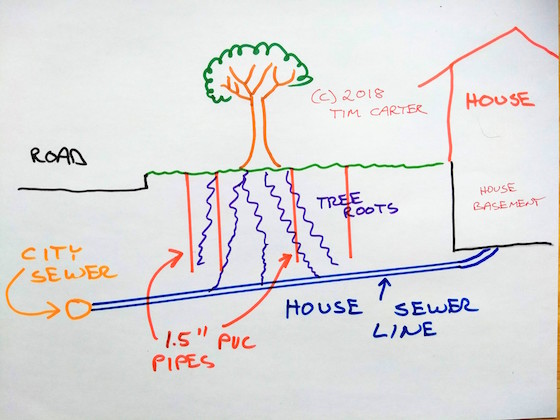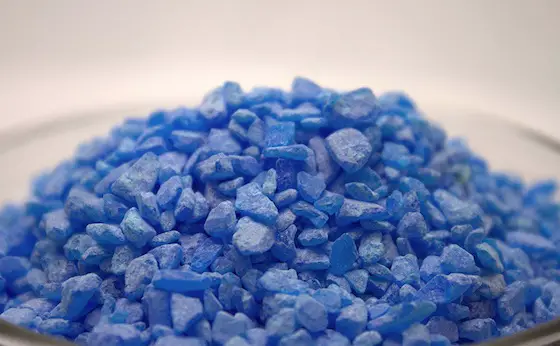
Stop tree roots sewer line problems this way. The red vertical lines are small 1.5-inch PVC pipes. Fill them with copper sulfate crystals and hot water and no more tree roots sewer line problems! Copyright 2018 Tim Carter
Tree Roots Sewer Line Tips
- Poison soil surrounding the sewer line with copper sulfate
- Install 1.5-inch PVC vertical pipes in the ground above the sewer line
- Use a 2-inch hand auger to drill holes into the soil
- Pour copper sulfate crystals into the pipe and add hot water
- CLICK HERE to subscribe to Tim's FREE & Funny Newsletter
"The root control/elimination products that flush down a toilet do little to solve the problem in my opinion...... The chemicals often only burn those portions of the roots that actually contact the water flow."
DEAR TIM: The sewer line in my house recently backed up. The plumber who cleaned out the line discovered tree roots were the problem. I've seen products that you flush down the toilet to solve this problem.
Are they effective? Is there a better, more long-term solution? I really don't have the money to install a new sewer line. Chuck S., St. Cloud, MN
DEAR CHUCK: Tree roots in sewer lines are probably one of the top ten plumbing problems, especially in older homes. Mother Nature has equipped many trees with sophisticated sensing capabilities.
Related Links
Minimize Clogged Drain and Sewer Lines
Free & Fast Bids
CLICK HERE to get FREE & FAST BIDS from local drain cleaning companies.
Why Do Tree Roots Enter Sewer Pipes?
The trees send out feeder roots in all directions in a search for both nutrients and water. The trenches that contain sewer lines rarely contained compacted soil. Roots are naturally drawn to this disturbed soil.
How do Tree Roots Enter Sewer Pipes?
Here is a wonderful hand-powered earth auger. It drills a two-inch diameter hole with ease.
Tree roots enter sewer pipes through small cracks in the joints between individual pieces of pipe. Old clay pipes often had the joints packed with mortar.
This mortar shrinks as it hardens allowing a tiny micro-crack to develop in the female hub of the old sewer pipe.
If tiny feeder roots discover these cracks they enter the pipe and continue their search for moisture and food. Once inside the pipe the roots enlarge and gorge themselves on the plentiful supply of water and food. I have actually taken out grotesque roots that have been over ten feet long and nearly one inch thick in diameter.
Does RootX Kill the Tree Roots?
RootX and other liquid products you pour into your toilet, in my opinion, treat the symptoms to a small degree, but they do NOT SOLVE the problem.
Water flow in a typical sewer pipe only fills a small percentage of the bottom cross section of the pipe. The chemicals often only burn those portions of the roots that actually contact the water flow.
Some of the chemicals are drawn into the root system but not enough, in my past experience, to completely wipe out the roots. The tree continues to grow and send roots out to take advantage of the underground oasis.
How Can You Stop the Roots From Entering the Sewer Pipe?
You stop tree roots from entering the sewer pipe by poisoning the soil on the outside of the sewer pipe. The tree roots will not enter this soil and thus can't get into the sewer pipe.
I've solved this problem for customers and at an old house, I used to own. You need to install a series of small vertical pipes above the sewer line that resemble miniature oil wells.
Copper sulfate crystals are put into the pipes along with hot water. The hot water dissolves the copper sulfate and this solution enters the soil above and around the sewer pipes.
Copper is a natural biocide and tree roots, algae, moss, or any living thing will avoid the copper-saturated soil.

These are large copper sulfate crystals. The come in 50-pound bags. CLICK THE IMAGE to have them delivered to your home.
Will the Copper Sulfate Kill the Tree?
No, the copper sulfate will not kill the tree. The tree roots will just avoid the copper-tainted soil and go find other water and nutrients.
How Do You Locate the Sewer Line?
Your best chances of success will happen if you can find a company that sends a small camera into the sewer line. By looking at a video monitor, the best camera operators can pinpoint the exact location outside where the roots are entering the pipe.
What's more, with electronic sensing equipment the professional can tell you the depth and path of the sewer pipe below the surface of the ground at this location. Armed with this data, you can permanently solve the problem.
CLICK HERE to get FREE & FAST BIDS from local drain cleaning companies.
How Do You Drill the Holes for the Small Vertical Pipes?
Using a simple earth auger or large drill, you will drill a vertical hole down towards the sewer pipe.
A 2 or 2.5-inch diameter hole works best as it provides plenty of room to insert a standard schedule 40 1.5 inch PVC pipe into the hole.
Stop drilling when the hole is about 24 to 30 inches above the top of the sewer pipe. Slide the pipe into the hole and glue a threaded female adapter equipped with a plug onto the end of the pipe at the surface. Make sure this is flush with the soil so that lawn mowers do not cut it off.
Can I Use City Records to Locate the Sewer Line?
I am ready to get to work. I made sure no underground utilities other than the sewer line were in my path.
Yes, you can use city records to locate the sewer line that runs between your house and the city sewer in the street or alley.
The records often will show you where the sewer tap was installed as it entered your property. You should be able to determine where the sewer line leaves your home. The plumber who installed the sewer line usually tries to install it in a straight line.
If you can't find a company with a sewer camera, use municipal sewer records to locate your sewer tap and try to estimate where the sewer line might be. Insert a number of PVC pipes in your yard hoping that you spot them above and near the sewer line.
How Much Copper Sulfate Should be Used?
Try to fill the vertical pipe halfway with the copper sulfate crystals. You can have the copper sulfate delivered to your home. CLICK HERE to order some. You'll need one or two 50-pound bags for sure.
Some home centers may carry them. Immediately pour hot water into the pipe until it flows out the top. The hot water will begin to dissolve the copper sulfate and then this solution will begin to seep into the soil above and around the sewer pipe. Tree roots do not like soil that has been treated with copper sulfate and they will avoid it completely. Add crystals as needed and pour hot water into the pipe every four months or so to stop those pesky sewer backups!
CLICK HERE to get FREE & FAST BIDS from local drain cleaning companies.
Column 326
The post Sewer Lines and Tree Roots appeared first on Ask the Builder.
Via builders feed http://www.rssmix.com/
No comments:
Post a Comment